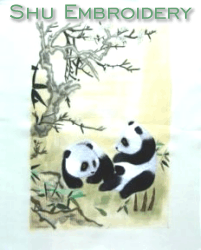Chinese Culture >> Chinese Handicrafts >> Shu Embroidery
Introduction to Shu Embroidery
Originating among the folk people in the west of Sichuan Province, Shu
embroidery formed its own unique characteristics: smooth, bright, neat and
influenced by the geographical environment, customs and cultures. Shu embroidery
works incorporate flowers, leaves, animals, mountains, rivers and human figures
as its themes. Altogether, there are 122 approaches in 12 categories for
weaving. The craftsmanship of Shu embroidery involves a combination of fine
arts, aesthetics and practical uses, such as the facings of
 quits, pillowcases,
coats, shoots and screen covers.
quits, pillowcases,
coats, shoots and screen covers.
Also called Chuan embroidery, Shu embroidery is the general name
for embroidery products in areas around Chengdu, Sichuan Province. Shu
embroidery enjoys a long history. As early as the Han
Dynasty, Shu embroidery was already famous. The central government even
designated an office in this area for its administration. During the Five
Chinese Dynasties and Ten States periods
(907-960), a peaceful society and large demand provided advanced conditions for
the rapid development of the Shu Embroidery industry. Shu embroidery experienced
its peak development in the Song Dynasty
(960-1279), ranking first in both production and excellence. In the mid-Qing
Dynasty, the Shu embroidery industry was formed. After the founding of the
People's Republic of China, Shu embroidery factories were set up and the craft
entered a new phase of development, using innovative techniques and a larger
variety of forms.
